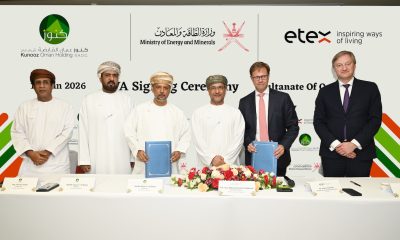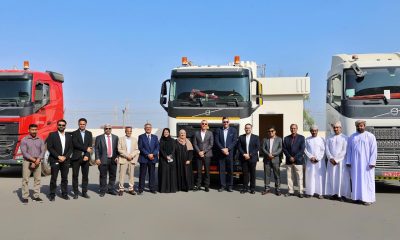Oil & Gas
Salary surprise: hits and myths of working in the Middle East

In a time of low oil prices and mothballed projects, the Middle East remains an attractive prospect for experienced oil and gas professionals looking for their next contract.
The numbers tell their own story: OPEC reports that in 2014, the Middle East accounted for approximately 23.51 million barrels of oil a day – or 30 per cent of global production. Although 2014 saw the rig count across the Middle East go down by 30, there were still 505 active in total, including 145 in Saudi Arabia and 135 in Iran.
In fact, today the Middle East is a centre for some of the world’s biggest, most exciting energy projects. Oil and gas developments worth approximately $700 billion are either planned or underway in the United Arab Emirates (UAE), for example. Abu Dhabi is investing an additional $25 billion in its oil industry over the next five years, while Kuwait Oil has committed to development projects worth at least $12 billion.
As a result, oil companies across the Gulf are looking for highly skilled foreign workers, especially at the managerial level. On the surface then, this looks like a marriage made in heaven: plenty of talent is available at a time when a number of extremely successful companies are looking to hire them. Add in a reputation for extreme wealth and low taxes, and the Middle East is suddenly a very appealing destination for workers migrating from more mature markets such as Calgary, Houston or Aberdeen.
However, professionals looking to move to the Middle East are often surprised to find that financial remuneration in the region is not as high as it is in Europe or North America. The total package will include travel and accommodation, and it will be tax-free, but even managers applying for a permanent position may find that the base salary on offer can be less than they have earned elsewhere.
Remuneration packages are allocated according to strict grading systems and salary scales and, in contrast to European and US firms, there is no deviation from these, even for the very best candidates.
That said, there is still a lot of positive news for these candidates. It’s always a mistake to generalise and salary arrangements in the region are no exception. Certain roles, for example, can still command the highest salary levels. Engineers, for instance, often find that they can earn a salary that is broadly in line with what is on offer in other parts of the world. On the other hand, when it comes to disciplines such as drilling and sub-surface – where good managerial candidates or drilling experts are traditionally more expensive – the salary on offer is perceived to be less than expected.
Equally, there are variations by country. Companies in stable states like Abu Dhabi or Dubai tend not to pay as much as companies in Iraq and Kurdistan. Saudi Arabia also tends to be in a slightly higher salary bracket to compensate for the cultural and social restrictions in place.
These differences are often reinforced by the nature of the contracts on offer. Expats in Iraq, Azerbaijan, and Kazakhstan are often on a four-four rotation, frequently on a contract basis. Salary and risk money is pretty much the only compensation available – and so tends to be higher.
In Saudi Arabia and the UAE, contracts are frequently offered on a permanent and residential basis. Employers prefer to have someone who is committing to the company for many years. This means that companies in these countries can compensate for lower pay rates with a broader package that takes family requirements into account.
This is an important part of the work experience in the Middle East. It’s a way of life that, for the right person, can be incredibly attractive. Residential standards are high, the weather is good, and security is tight. The tax-free salary comes with plenty of facilities to support family life and social activities.
Across the region, firms recognise that they are in competition with each other for the best candidates. Many are attempting to upstage each other with facilities for expats. Some firms, for example, are building massive complexes with sports facilities, swimming pools and shopping centres – all for the valuable expat community.
Equally, there is a sense of security and longevity when it comes to taking on roles in these countries. This is the antithesis of the short-termism that can be found elsewhere, where the end of a contract is always a looming concern. It can be a powerful incentive for professionals looking to build up long-term financial security for themselves and their families. The size, scale and nature of the projects means that working in the Middle East offers very good CV points. It helps that the health, safety and environmental standards in place are now comparable with those found anywhere else in the world.
It is generally recognised by the majors in the region that their position on salary can restrict their choice of candidate. They are therefore working hard to compensate in every other area. For professionals looking for the next step in their career, for certainty and security, or for a different way of life, a move to the Middle East has plenty to recommend it. But a realistic approach is essential. Salaries are not what people expect. The advantages of the Middle East are more nuanced than that.
By Jon France at Petroplan
-

 News2 months ago
News2 months agoAI Security Conference 2025 Hosted by Securado Highlights the Changing Cybersecurity Landscape
-

 Insurance2 months ago
Insurance2 months agoSupporting Community Wellness: Liva Insurance Sponsors Muscat Marathon 2026 with Free Health Checkups
-

 Interviews1 month ago
Interviews1 month agoEXCLUSIVE INTERVIEW: TLS Rebranding Marks Strategic Leap Toward Innovation, Sustainability & Growth
-

 Insurance1 month ago
Insurance1 month agoLiva Insurance Supports Community Wellness Through “Experience Oman – Muscat Marathon 2026”
-

 Investment3 weeks ago
Investment3 weeks agoLalan Inaugurates Its First Overseas Manufacturing Facility, Marking Sri Lanka’s First Investment in SOHAR Freezone
-

 Banking & Finance1 month ago
Banking & Finance1 month agoA New Platform for SME Growth: Oman Arab Bank Unveils Tumouhi
-

 News3 weeks ago
News3 weeks agoKunooz Oman Holding Partners with Belgian company Etex for Local Gypsum-Based Business Development
-

 Construction4 weeks ago
Construction4 weeks agoInternational Heavy Equipment hosts Open Day at its Refurbished Facility in Sohar Industrial Area






























You must be logged in to post a comment Login